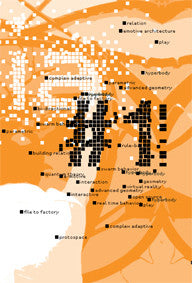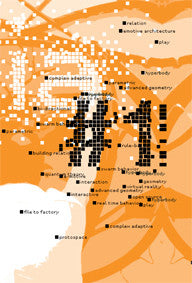Your cart is currently empty!
Architecture
iA#1 - Interactive Architecture
+++ +++
+++Kas Oosterhuis, Xin Xia [eds]+++
978-90-5973-058-8 [episode]
Danielle van Steenbergen, Xin Xia
96
21 x 12
Paperback
English
A new series on interactive architecture
The iA, or Interactive Architecture, bookzine series will consist of 12 issues bi-annually, published over a period of six years under the supervision Kas Oosterhuis, director of Hyperbody at the Delft University of Technology and principal of ONL [Oosterhuis Lénárd].
The Interactive Architecture (iA), concept is based on the equal input (listening), process (thinking), and output (talking) of people as well as the built components of architecture. This will be one of the first publications to document in detail this groundbreaking new development in architecture. iA will undoubtedly become the premier archive of this endeavor. The publication program will consist of scientific papers on particular aspects of iA and iA-driven MSc projects, iA-inspired case studies from practice, interviews with a renowned researcher/practitioner, and blogs by Kas Oosterhuis.
Kas Oosterhuis (series editor - iA)
'What is Interactive Architecture? Let me first clarify what it is not. Interactive Architecture - from here on abbreviated as iA - is not simply architecture that is responsive or adaptive to changing circumstances. On the contrary, iA is based on the concept of bi-directional communication, which requires two active parties. Naturally, communication between two people is interactive; they both listen [input], think [process] and talk [output]. But iA is not about communication between people, it is first defined as the art of building relationships between built components and second, as building relations between people and built components.'
Contributors to this first issue of iA are Cas Aalbers, Ayssar Arida, Henriette Bier, Nimish Biloria, Michael Bitterman, Sven Blokker, Sander Boer, Lukas Feireiss, Christian Friedrich, Hans Hubers, Tomasz Jaskiewicz, Chris Kievid, Kas Oosterhuis, Dominik Otto, Dimitris Theocharoudis and Xin Xia.
€18.00
iA#1 - Interactive Architecture
€18.00
Architecture / Bookazines / Series / Design / Theory
978-90-5973-058-8 [episode]
Danielle van Steenbergen, Xin Xia
96
21 x 12
Paperback
English
A new series on interactive architecture
The iA, or Interactive Architecture, bookzine series will consist of 12 issues bi-annually, published over a period of six years under the supervision Kas Oosterhuis, director of Hyperbody at the Delft University of Technology and principal of ONL [Oosterhuis Lénárd].
The Interactive Architecture (iA), concept is based on the equal input (listening), process (thinking), and output (talking) of people as well as the built components of architecture. This will be one of the first publications to document in detail this groundbreaking new development in architecture. iA will undoubtedly become the premier archive of this endeavor. The publication program will consist of scientific papers on particular aspects of iA and iA-driven MSc projects, iA-inspired case studies from practice, interviews with a renowned researcher/practitioner, and blogs by Kas Oosterhuis.
Kas Oosterhuis (series editor - iA)
'What is Interactive Architecture? Let me first clarify what it is not. Interactive Architecture - from here on abbreviated as iA - is not simply architecture that is responsive or adaptive to changing circumstances. On the contrary, iA is based on the concept of bi-directional communication, which requires two active parties. Naturally, communication between two people is interactive; they both listen [input], think [process] and talk [output]. But iA is not about communication between people, it is first defined as the art of building relationships between built components and second, as building relations between people and built components.'
Contributors to this first issue of iA are Cas Aalbers, Ayssar Arida, Henriette Bier, Nimish Biloria, Michael Bitterman, Sven Blokker, Sander Boer, Lukas Feireiss, Christian Friedrich, Hans Hubers, Tomasz Jaskiewicz, Chris Kievid, Kas Oosterhuis, Dominik Otto, Dimitris Theocharoudis and Xin Xia.



